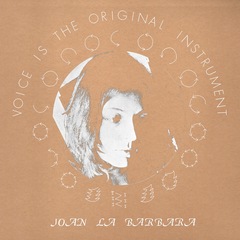For some, experimental vocalist and composer Joan La Barbara will always be a hard sell. Her compositions are designed more for exploration than entertainment; like her contemporaries Yoko Ono, Meredith Monk, and Patty Waters, she has dedicated a healthy chunk of her career to traversing the outer limits of the human voice. Like those artists, she’s done so at the risk of sounding goofy, shrill, or downright weird to more closed-minded listeners. Her work with extended vocal techniques requires a high degree of virtuosity and discipline, but some have found it easy to write it off as a lot of moaning and shrieking (I once had a person call into my college radio show while I was playing one of her compositions to helpfully remark "you’ve gotta be fucking kidding me"). Still, her work has its dedicated followers, this writer among them, and she remains a sought-after collaborator nearly five decades into her career.
Voice Is The Original Instrument is a reissue of La Barbara’s first solo outing, originally self-released on her Wizard Records imprint in 1976 on the heels of seminal work with Steve Reich and Philip Glass. La Barbara was also featured heavily on works by luminaries such as James Tenney, Robert Ashley, John Cage, and her husband Morton Subotnick in this timeframe, with many of these composers writing pieces specifically around her unique skill set. Here, though, we find La Barbara at her barest, with two tracks out of three dedicated to extended a cappella workouts entirely untouched by studio trickery.
‘Circular Song’ is an evocative, almost harrowing exercise in ‘circular breathing’, with La Barbara careening up and down scales without pause for seven and a half minutes. Sounding something like a relentless human slide whistle, it is one of the tracks most likely to seem silly in passing, but its difficulty of execution alone is enough to warrant closer inspection. ‘Voice PIece: One-Note Internal Resonance Investigation’ is more buzzing and guttural, recalling both a didgeridoo and a child impersonating an airplane. La Barbara performs with focus and serious intent, but there’s nonetheless something playful in the way these pieces thumb their nose at the norms of ‘serious music’ (if you ever have the good fortune to see La Barbara perform to a staid classical-minded audience, it is an experience which comes with my highest recommendation, as its musical enrichment is well compounded by the joy of watching the variety of flummoxed reactions).
As fascinating as both those pieces are, it is the sidelong closer ‘Vocal Extensions’ which goes most delightfully off the rails, and which most presages the moves of vocal eccentric kin like Maja Ratkje and Dylan Nyoukis. Run through live electronic treatments, La Barbara gets bizarre and improvisational, clicking and gnawing, gurgling and squealing. It’s a bent masterwork, an otherworldly collision of control and abandon which makes even the early recordings of Ono or Annette Peacock sound reined in.
It would be disingenuous to say that there’s nothing goofy about Voice Is The Original Instrument, but it would be plain wrongheaded to think that this is a shortcoming. Sometimes something has to sound funny to challenge rigidity and monotony, and as with all truly funny things, there are layers to unpeel and contemplate, depths of thought and emotion to plumb. Funny or not, Voice Is The Original Instrument still sounds vital four decades on, plenty long enough to outlast any dismissive snickering by a significant interval.


